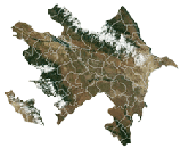Representatives of the State Statistical Committee participated in the UNDA 9th tranche: Kick-off meeting, held in Almaty, Kazakhstan
Representatives of the State Statistical Committee Farhad Aliyev - Deputy Head Coordination of Statistical Works Department and Sabina Ahmedova – Head Adviser, Lawyer participated in the UNDA 9th tranche: Kick-off meeting organized by UNECE and EFTA held on 10-11 December, 2014 in Almaty, Kazakhstan.
Heads of statistical organizations and representatives of Azerbaijan, Armenia, Belarus, Georgia, Kazakhstan, Kyrgyzstan, Mongolia, Norway, Moldova, Russian Federation, Tajikistan, Turkey, Ukraine, Uzbekistan as well as representatives of EFTA, Eurasian Economic Commission, Eurostat, UNECE and independent experts participated in the meeting.
The meeting was introduce the UNDA 9th tranche project "Strengthening national capacity in the most vulnerable UNECE countries for the sustainable development of statistics", its objectives and tools for its monitoring and achievement. The meeting allowed participants to share ideas and current good practices in implementing recommendations provided in respective Global Assessments reports. Participants from beneficiary countries were also invited to express needs for specific technical support to be delivered in the framework of the project.
The meeting was organized in 2 substantive sessions:
Session I: UNDA 9th tranche project - Objectives, implementation and monitoring mechanisms. This session started with UNECE presentations to introduce the project and its objectives. The session promoted discussion and exchange of ideas on different tools to support the implementation of recommendations of Global Assessments. The presentations were followed by a group discussion. Participants were split into groups to discuss their needs and expectations of the project.
The session resumed in plenary. Each group reported on the outcomes of the discussions, which was eventually be summarized and proposed as conclusions.
Session II: Legal and institutional framework of official statistics. The session discussed the importance of sound legal and institutional frameworks and coordination mechanisms of national statistical systems based on the UN Fundamental Principles of Official Statistics as well as European and other national Statistics Codes of Practice.
This session started with general presentations and discussions followed by a group discussion. Participants were split into two groups for discussions on current challenges relating to legal and institutional frameworks and coordination mechanisms for national statistical systems based on specific country experiences and outcomes presented and commented upon afterwards in plenary.
At the end of the meeting presentations on discussions carried out by the groups were presented.









